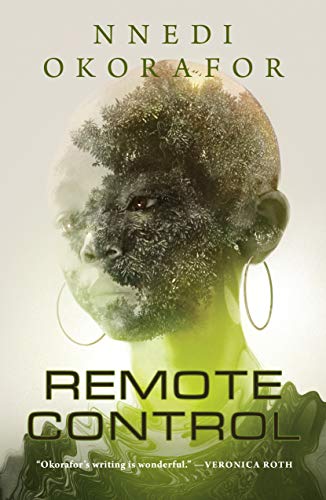
![]() Remote Control by Nnedi Okorafor
Remote Control by Nnedi Okorafor
Remote Control (2021) is the newest novella from Nnedi Okorafor, a quiet, interior-focused and episodic work that is at times a haunting, tragic coming of age tale of magic and mystery, at other times a concisely and sharply effective observer of modern trends, and, depending on the reader, at other times a frustratingly vague story full of unanswered questions. Overall, I enjoyed it quite a bit, finding it to be the sort of story that lingers in the head.
Six-year-old Fatima lives a happy family life in a near-future Ghana despite her frequent bouts with malaria. But when a meteor shower filled with “beautiful green streaks decorating the sky” drops at the base of her favorite tree a “seed [that] glowed a bright green [with] light seeping from it like oil,” it changes her life and those of everyone she knows and loves, even though her father soon sells it off to a local politician. The seed, though, had already bestowed its gift/curse on Fatima, though she wouldn’t learn its true power until a horrifying tragedy a year later that forces her from town.
Over the next few years, Fatima, going now by Sankofa, lives an itinerant life, a fox her only companion as she wanders northern Ghana on the track of her sold-off seed, which she can still sense. Stories grow first in her wake and then preceding her arrival, stories of the adopted Daughter of Death/nature spirit/witch with the power to kill with a thought. Out of sometimes respect, sometimes fear, sometimes both, people give her whatever she asks for — shelter, food, clothing. This is how she survives into her early teens when the story opens up, before flashing back and then eventually coming full circle.
As noted, this is a quiet, introspective novel, with only a few moments of what one might call “action,” a few scenes creating suspense or fear for Sankofa. Mostly it’s a story of a girl too young to be given a horrible power she can’t control at first, of how it destroys everything she knows and loves, and how she eventually learns first to live with it (and her grief/guilt), then use it to carve out a place for herself in a world she’s never truly a part of. This part is lovely, haunting, and sometimes heartbreaking. One of my favorite moments is when Sankofa weeps for her father, an overcoming grief that rises up from the smallest, most mundane of things.

Nnedi Okorafor
Okorafor also uses the story to briefly but effectively explore or comment on other ideas beyond this girl’s coming-of-age. We see a near-future Ghana that is a mix of technology and old ways, with the two not always co-existing smoothly or positively. The power of story and myth, the ways they are born, change in the telling, and have power over lives is another theme. As is a reliance on technology and the lack of privacy it brings. Issues of gender and class rear up. For instance, it is only Sankofa’s deadly ability that allows her to travel freely as a young girl (a power she is forced to use on multiple occasions to protect herself against men). Another woman, one who holds a more mundane power, does so tenuously, as she is informed by a man who wishes to deprive her of it: “You’re just a woman … So do what women do, step back and let us take.” Meanwhile, America and corporations form a somewhat abstract villain always in the background, particular via a company called LifeGen, described by one character as “that fucking big American corporation that’s probably going to eventually destroy the world.” Amongst other things (they’re the company that wanted the green seed), LIfeGen is a pharmaceutical company, and there’s a quick but sharp aside about using Africans as guinea pigs for drug trials (not a “futuristic” concept btw). Finally, I think one can also read events and characters in the story on a more metaphorical, allusive level, the type of layered reading I always enjoy (I was going to say “if I’m right” but then realized I still enjoyed reading the novella that way whether intended or not). I’ll leave it to the individual reader, though, to suss out whatever may be there.
Some readers may have issues with the story in how, like the main character, it slowly meanders. Those who like explanations will also find themselves frustrated. In many ways this has a very fable-like feel to it and so unless I’m missing something, I don’t think “answers” are either offered or even intended. The ending is also a bit ambiguous. I have my own reading, but I can certainly see others, and it’s possible it’s a true ending (i.e. a standalone book’s “resolution”) or it’s a transition point to a sequel. Personally, I kind of prefer the former.
Novellas are tricky animals. Certainly there was room for more development of plot and character, but I wouldn’t at all call it necessary, and it’d be all too easy to lose the magic and mystery of the story by filling in too many details and adding too much background. A short story, on the other hand, I don’t think would have allowed us to inhabit the character of Sankofa long enough to fully react to events in as powerful a way or allowed the narrative voice to capture us as completely. With Remote Control, I’d say Okorafor hit the sweet spot.



I didn’t know about this one but I’ll have to go get it, maybe today.
I’ve gotten to the point where if Bill says it’s good, I go read it. We have remarkably similar taste in literature. So, adding this one to the list!
Here’s hoping the streak continues! (Now I’m feeling some pressure . . . )
:)